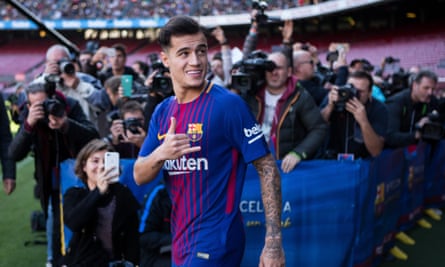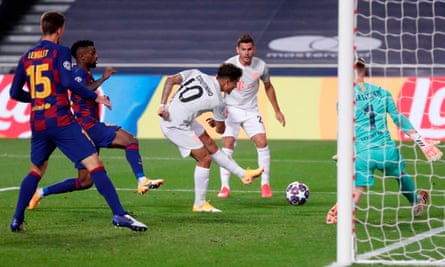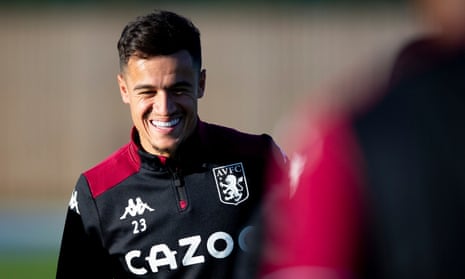The most significant goals Philippe Coutinho scored as a Barcelona player were against them, which pretty much sums it up. On loan at Bayern Munich, where he had his most successful season since leaving Liverpool for €160m, he got two in the 8-2 humiliation of the club that owned him then and despite all their efforts to the contrary still own him now. That night in August 2020 he raised a hand to apologise for what he had done. Seventeen months later, he has left again. As for what he has done, most supporters would say: “Nothing much.”
The only thing anyone in Catalonia regrets about Coutinho’s departure to Aston Villa this week is that it took too long. Actually, that’s not entirely true: they also regret that there will be no return, except his. At the end of the season, he will probably be back. At which point, they will try to get him to leave again. It was hard enough to bring him in; it proved equally hard to move him out. He has gone only on loan, Villa – who are at home to Manchester United on Saturday – paying 65% of his salary, but at least he has gone. The most expensive signing in Barcelona’s history may have been the worst.
All of which might sound unfair, even cruel. And it probably is: there has been something uncomfortable in watching the treatment of him at times, in that glimpse of vulnerability and rejection; in the feeling that while there is certainly culpability, circumstance, culture and context conspired against him; in watching the good moments slip from view, lost to some collective amnesia. Because there have been goals for Barcelona too: 26 of them plus 14 assists in 106 games is not a terrible return.
He scored the opener in a clásico, setting Barcelona on course for a 5-1 demolition of Madrid. He scored in a Copa del Rey semi-final and provided a goal and an assist in the final, helping them complete a double in his first season. He was not playing when they collapsed and were knocked out the Champions League in Rome, so that could hardly be held against him. Had he been there, who knows, maybe they would have won a treble. Which he did with Bayern. There was something about him scoring in Lisbon that expressed that the mess is not of his making.
And yet those two Bayern goals may well be the most telling image of his time as a Barcelona player, precisely because they were symbolic of how damaging the whole thing has been: self-inflicted, literally and metaphorically an own goal. A portrait of the regime of the former president Josep Maria Bartomeu, a metaphor for the whole crisis and how they got into a situation like this. None of the goals Coutinho scored for Barcelona, forgotten too fast, leave an impression as lasting. Which may be unfair, but a sort of melancholy clings to his story, to him.

This ending, which may not even be the end, expresses it. Barcelona were so desperate to sign Coutinho that having failed to get him in the summer of 2017 they came back again at Christmas, and for a combined cost with Ousmane Dembélé that the club’s finance director had said would be “irresponsible”, a sackable offence. Their most expensive player leaves for nothing, and even managing that ended up feeling like an achievement. Above all, it was a necessity.
When Coutinho signed Barcelona made much of how he had made a “financial effort” to come, which is what clubs too often say and which proved ironic. Tied to a salary of about €15m a year after tax, for the past three years they have been as desperate to give him away, but the same salary that made moving him on so important, pushing him towards the door before other players equally deserving, also trapped him.
Everyone knew that they had overspent when he arrived, which is rarely a good start, but the signing made sense. Xavi Hernández, Barça’s current manager, was among those who thought his style compatible with the Camp Nou. But if he said so then, from the outside, four years on, now inside, he doesn’t entirely see it. The sporting director judged him the “ideal replacement” for Andrés Iniesta, which may have been part of the problem just as the price was. Iniesta’s position was not his, nor exactly was Neymar’s.

The technical quality was there though, as was the physical capacity brought from England, at least for a while. So too was the welcome – Luis Suárez collected him from the airport – and the first six months were good, a point that at this juncture feels worth making in his defence: he got nine goals and seven assists in his first 22 games. Yet he could not play in Europe and when he arrived Barcelona were a long way clear in the league, their success not really seen as his. By the end it felt almost as if he wasn’t really there. He was hit by injury and, it seemed, insecurity.
Ernesto Valverde had to find a place for him, which wasn’t easy. There was little point in someone else “being Messi” when they had Lionel Messi. Messi and Suárez were relieved of some responsibility to press; accommodating another one wouldn’t work. Attempts to find another role were not always reciprocated. Instead of a determination to rebel against his fate, fight for that role, there was a hint of inhibition. Coutinho was well-liked and those who trained with him saw things – just not often on match days. The club’s culture did not help either.
The second season started with four goals and an assist in the opening 10 league games, including that strike against Madrid, without Messi in the team. But there was just one of each in his next 26 La Liga appearances. Frustration grew among fans; whistles followed to which he was not impervious. When he scored against Manchester United in the Champions League quarter-final, he put his fingers in his ears, vulnerability revealed. Which of course made it worse.
Suárez said, tellingly: “The smallest thing you do – tiny, like Philippe did – is made bigger. The manager said it: ‘I’m surprised you’re talking about the gesture and not the great goal he scored,’ a goal that would have given him confidence. Sometimes you have to understand him. If fans want a player to perform, support him, because a player out on the pitch isn’t stupid. He hears it when he loses a ball and there’s this ‘zzzzzhhhhhiiii’.”
The following season Coutinho was in Munich, the first rejection but maybe a chance for a return when Bayern decided not to exercise their right to buy, itself a comment on confidence in him. Sales were sought but not found, so he was stuck.

That said, if bound by circumstance, there was support back at Barcelona. Ronald Koeman, a new manager, called and said he wanted to play him in his position: as a No 10 behind Messi. There were two assists and a goal in the opening three league games. He scored in his first Champions League match too. And then there was … well, not much, Coutinho fading again. A meniscus injury meant he didn’t play a game after the turn of the year. He underwent three operations and spent nine months out.
He was too expensive for this, for a club forced to lose the best player they have had. And, yes, Coutinho still being there while Messi wasn’t played its part in his public portrayal, however unjust that was. Again, they tried to move him on. Again, they failed. He talked about working to make people look upon him with “other eyes”. Messi’s departure offered opportunity too. Asked about Coutinho after an impressive display early this season, Koeman replied: “He’s a good footballer. It’s my job to get the best out of them and that starts with putting them in their position.”
“I have always believed in Coutinho,” Koeman had insisted but others didn’t – and, it sometimes felt, that might have included Coutinho himself. When he scored against Valencia in October, his first goal in a year, he said he had a “scar that makes me stronger” and a “desire to be the best I can be”. But at Barcelona, he never really was. Ten days later, Koeman was gone. Now Coutinho has gone, for a second time. “Since I came back I never had a run of four or five starts in a row to be able to be at my best level,” he said. Now, he may get them, another chance to have an impact in someone else’s shirt.

Comments (…)
Sign in or create your Guardian account to join the discussion